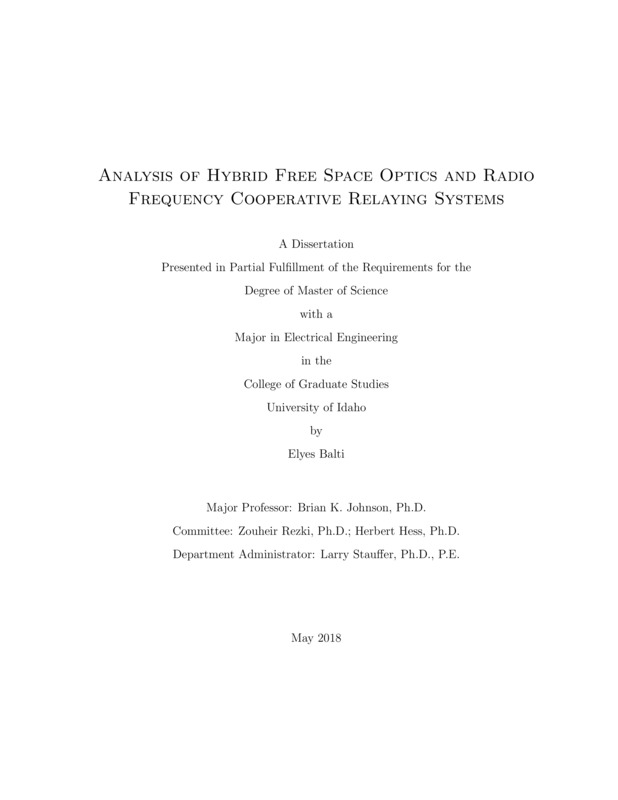Analysis of Hybrid Free Space Optics and Radio Frequency Cooperative Relaying Systems
Balti, Elyes. (2018-05). Analysis of Hybrid Free Space Optics and Radio Frequency Cooperative Relaying Systems. Theses and Dissertations Collection, University of Idaho Library Digital Collections. https://www.lib.uidaho.edu/digital/etd/items/balti_idaho_0089n_11359.html
- Title:
- Analysis of Hybrid Free Space Optics and Radio Frequency Cooperative Relaying Systems
- Author:
- Balti, Elyes
- Date:
- 2018-05
- Program:
- Electrical and Computer Engineering
- Subject Category:
- Electrical engineering
- Abstract:
-
The exponential increase in the number of mobile users, coupled with the strong demand for high-speed data services results in a significant growth in the required cellular backhaul capacity. Optimizing the cost efficiency while increasing the capacity is becoming a key challenge to the cellular backhaul. It refers to connections between base stations and mobile switching nodes over a variety of transport technologies such as copper, optical fibers, and radio links. These traditional transmission technologies are either expensive, or cannot provide high data rates. This work is focused on the opportunities of free-space-optical (FSO) technology in next generation cellular backhaul. FSO is a cost effective and wide bandwidth solution as compared with the traditional radio-frequency (RF) transmission. Moreover, due to its ease of deployment, license-free operation, high transmission security, and insensitivity to interference, FSO links are becoming an attractive solution for next generation cellular networks. However, the widespread deployment of FSO links is hampered by the atmospheric turbulence-induced fading, weather conditions, and pointing errors. Increasing the reliability of presented systems, while still exploiting their high data rate communications, is a key requirement in the deployment of an FSO-based backhaul. Therefore, the aim of my research topic is to provide different approaches to address these technical challenges. Moreover, performance analysis of asymmetric mmWave RF/FSO dual-hop systems is analyzed. In such system models, multiple RF users can be multiplexed and sent over the FSO link. More specifically, the end-to-end performance metrics are presented in closed-form. This also has increased the interest to study the performance of dual-hop mixed FSO/RF systems, where the FSO link is used as a multicast channel that serves different RF users. Having such interesting results motivates further the analysis of dual-hop FSO fixed-gain relaying communication systems, and exact closed-form performance metrics are presented in terms of the bivariate H-Fox function. This model is further enhanced through the deployment of a multihop FSO relaying system as an efficient technique to mitigate the turbulence-induced fading as well as pointing errors. Furthermore, unlike similar works in the literature, I assumed that the relays are succeptible to hardware impairments that are harmful to the system performance. In fact, for a low rate system, the approximation of neglecting the hardware impairments is still valid. However, the effect of the imperfections become more pronounced for high rate systems particularly for the mmWave RF/FSO systems since they are operating at high rate. Capitalizing on this, I provide a global framework analysis for the impact of the impairments on the relaying systems. I mainly studied the impacts of High Power Amplifier (HPA) non-linearities and I considered the Soft Envelope Limiter (SEL), Traveling Wave Tube Amplifier (TWTA) and Solid State Power Amplifier (SSPA). Finally, performance metrics such as the end-to-end outage probability, the bit error probability, the ergodic capacity are derived in terms of the Meijer-G function, along with univariate, bivariate and trivariate Fox-H functions. Since the mathematical derivations include very complex functions, the asymptotical high signal-to-noise ratio are derived in terms of elementary functions to get engineering insights about the system gains such as the diversity and the array gains.
- Description:
- masters, M.S., Electrical and Computer Engineering -- University of Idaho - College of Graduate Studies, 2018-05
- Major Professor:
- Johnson, Brian K
- Committee:
- Rezki, Zouheir; Hess, Herbert
- Defense Date:
- 2018-05
- Identifier:
- Balti_idaho_0089N_11359
- Type:
- Text
- Format Original:
- Format:
- application/pdf
- Rights:
- In Copyright - Educational Use Permitted. For more information, please contact University of Idaho Library Special Collections and Archives Department at libspec@uidaho.edu.
- Standardized Rights:
- http://rightsstatements.org/vocab/InC-EDU/1.0/

